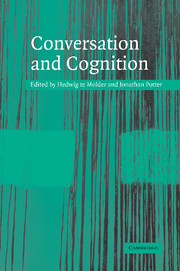Book contents
- Frontmatter
- Contents
- List of contributors
- Acknowledgements
- Transcription conventions
- 1 Talking cognition: mapping and making the terrain
- Part I The interface between cognition and action
- Part II Cognition in action
- 7 Is confusion a state of mind?
- 8 Cognition in discourse
- 9 From process to practice: language, interaction and ‘flashbulb’ memories
- 10 ‘My memory has been shredded’: a non-cognitivist investigation of ‘mental’ phenomena
- 11 Discursive psychology, mental states and descriptions
- References
- Index
10 - ‘My memory has been shredded’: a non-cognitivist investigation of ‘mental’ phenomena
Published online by Cambridge University Press: 22 September 2009
- Frontmatter
- Contents
- List of contributors
- Acknowledgements
- Transcription conventions
- 1 Talking cognition: mapping and making the terrain
- Part I The interface between cognition and action
- Part II Cognition in action
- 7 Is confusion a state of mind?
- 8 Cognition in discourse
- 9 From process to practice: language, interaction and ‘flashbulb’ memories
- 10 ‘My memory has been shredded’: a non-cognitivist investigation of ‘mental’ phenomena
- 11 Discursive psychology, mental states and descriptions
- References
- Index
Summary
Introduction
In the cognitive sciences, activities like seeing, remembering, recognizing, learning, problem solving and decision making tend to be treated as individual processes for recording, retrieving and configuring information. Everyday actions are regarded as surface behaviours which are caused by underlying mental and neurological processes; processes that are often masked by the contingencies of everyday situations and the referential ambiguities of ordinary language. Technological advances in the ability to visualize the interior of the skull have reinforced the tendency to pursue cognitive processes into the recesses of the mind-brain.
Although fuelled by impressive neuroscientific breakthroughs, the philosophy of mind that animates cognitive science has been criticized for more than a half century by Wittgensteinians and ordinary language philosophers. In his later philosophy, Wittgenstein (1958) rejects the presumption that thinking, knowing, giving reasons, looking, seeing, and so forth, are products of internal mental mechanisms. He does not propose a competing causal explanation of thought, mind and knowledge, but instead he explicates how ‘mental’ concepts (like other everyday concepts) are grounded in communicative actions produced by competent members of a linguistic community. To the extent that they pay any attention to such arguments, proponents of cognitive science typically dismiss them as out of date and unscientific, but as Button et al. (1995) argue, Wittgensteinian and ordinary language arguments are as pertinent as ever.
- Type
- Chapter
- Information
- Conversation and Cognition , pp. 226 - 240Publisher: Cambridge University PressPrint publication year: 2005
- 32
- Cited by



